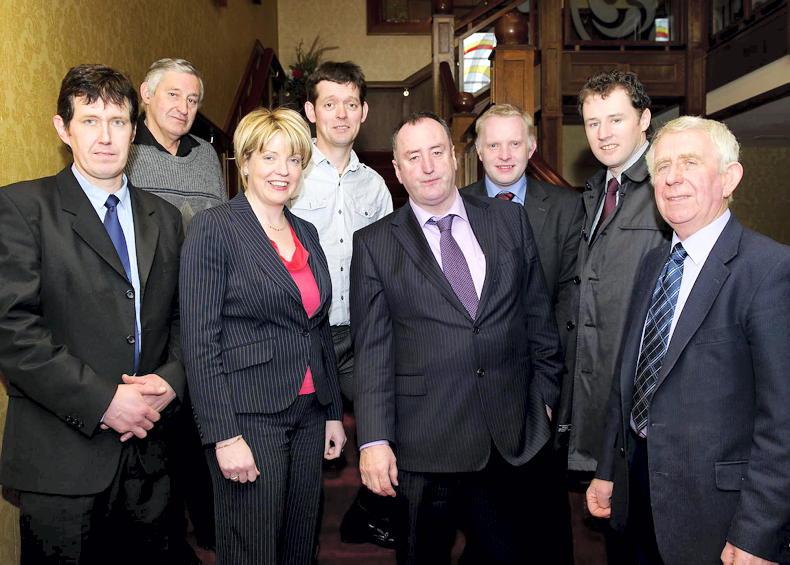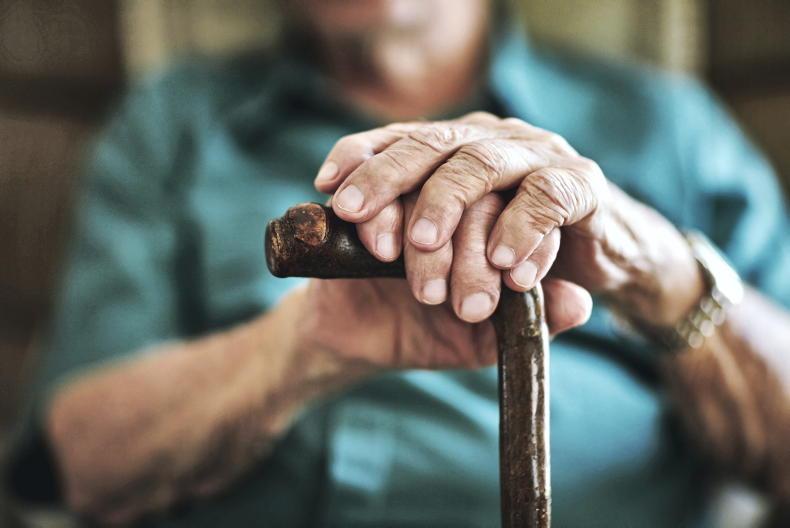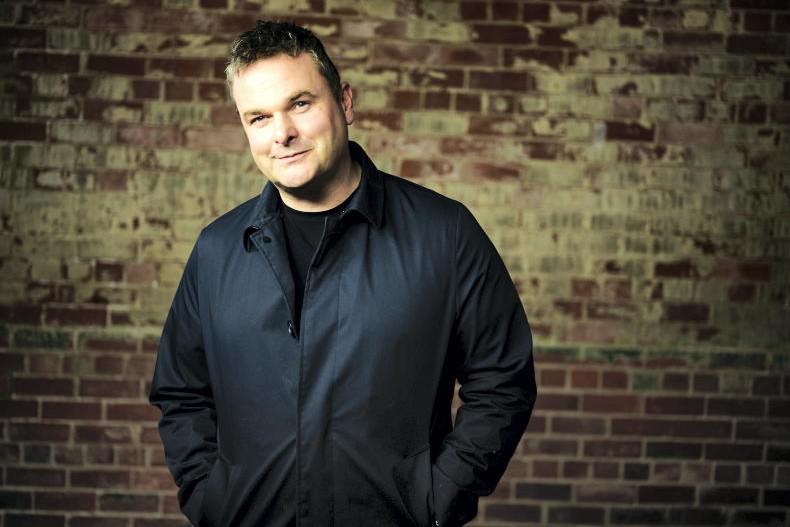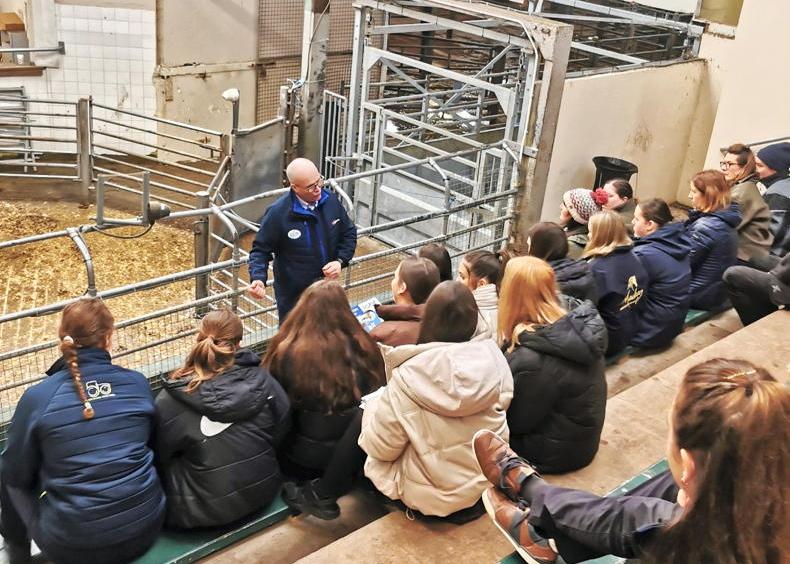We look at the enormous thick yellow cookies that have arrived on the side of our coffee cups. “There are no calories in those. No sugar, no butter! Life’s too short,” former Donegal TD and Minister for Agriculture (amongst many portfolios), Mary Coughlan pronounces, as she picks up hers. I follow suit. Over a political career, spanning almost a quarter century, she faced many challenges both political and personal, so it is not surprising that Mary takes that view.
With this wealth of experience, she draws comparisons between the difficulties of attracting women into agriculture and into politics. And although the Women in Agriculture Dialogue taking place on St Brigid’s Day is the main point of our meeting, we start with her old life.
“Agriculture brings you everywhere. Years ago I launched a book in Mullinavat. Afterwards, you had to go to the pub for tea and some sandwiches. Then I went to a Cuman meeting, a Comhairlí Ceantair meeting and a dance and then I went home to Donegal,” she remembers.
Twelve years ago this February, Mary lost her seat at the 2011 general election. This loss was generally considered the most high profile casualty for Fianna Fáil. Soon, however, caring responsibilities became the primary focus.
“My husband [garda, David Charlton] was sick. So I looked after him and then my mother was unwell. My kids were young enough after their dad died so I had to look after them, get them through school, Maeve through third level and Cathal his apprenticeship. So I was caring and getting myself back together again really.”
When an opportunity presented itself Mary set up a consultancy company, specialising in tourism, agriculture and the environment, with one client initially and from there, it grew.
“I didn’t want to be in a situation with absolutely no life in the corporate world where I couldn’t look after my kids and no free time. Plus, I wanted to live in Donegal. I decided I would be the master of my own destiny. Now I have slipped from that this last while but I enjoy it,” says Mary of the day job.
Volunteering under pressure
She smiles admitting that “like every other former politician, you’re stuck in every voluntary organisation. The GAA, the local hall, the school, the church.”
And to some extent politics.
“I tried to stay away from politics, because I wanted other people to take over. I think that is hugely important. But I do work with my local councillors and Charlie (Charlie (McConalogue, who is the Fianna Fáil TD in Donegal since 2011). People still naturally come for advice or help. I pass it on. That’s my network, I know people.”
Preparation for the local elections, the Europeans and the general election are afoot. It was Charlie that asked Mary if she would chair the Dáilcheantair, to which she says she “reluctantly agreed to try rejuvenate the party in the constituency” and look strategically at where they can win more seats. She says that this is temporary.

Mary Coughlan with members of Donegal IFA when she was TD in 2011. L-R: John McGilloway, William Mackey, Mary Coughlan, William McLaughlin, John Bryan, IFA National President, Davy Keith, Charlie McConalogue, (at this time a Fianna Fáil candidate for election) and William Monagle, Donegal IFA Chairman. / Photo Clive Wasson
“I want other people to bring something new. Unfortunately, and it’s like every other voluntary organisation in the world, it’s very difficult to get people to commit. So to drive it on is what I would like to do, and then hopefully, someone else will take over.”
Women in politics
Although possibly more reflective now of being a women in politics, she is none the less adamant that she “didn’t get elected because I was a woman. Yes, I had a family history, but I recall saying in 1989 in my second convention – ‘my first convention was based on those who went before me, but this time to get re-elected, it was on my own method, my own two feet’.”
So I ask, is it that when women are given that initial opportunity, they will succeed? “Yes,” she replies. “You have to give them that lift. That is why when I say, I was, against quotas, we have to be more cognizant of the fact that women and younger people are needed in political life. At the end of the day, who’s going to run the country, the younger people have to take responsibility.”
The demise of the town council was a negative step she believes for women as “that little step into political life is lost. Quite a lot of women were town councillors, because the meetings were in the evening, they had time to participate. There’s a lot of women in community life. They have great capacity and talent, but they’re apprehensive about getting into political life.”
Much like politics or public service in general it is difficult to attract people. This is a concern to Mary. “First of all, people don’t have an awful lot of time. Second, a lot of people feel, they won’t do a good enough job, or that once you put your head over the parapet, somebody’s going to knock you straight off of it”.
The latter she says is “a wee bit like what society has turned out to be at this moment. We have to respect other people’s point of view. I’m not saying that you shouldn’t question authority but the vitriol that people have to put up with, it’s just not acceptable.”

Mary Coughlan \ by Claire Nash.
However, she is equally concerned that “people can’t take any challenge either and there’s no resilience. Life has a lot of hard knocks and you must have the resilience and the capacity in yourself to be able to take on as many hard knocks as you can.”
For any career where your view will be questioned or criticised these are important characteristics but support is fundamental she says; “There are people who have broken this glass ceiling and are very driven and maybe had the financial wherewithal to be able to support themselves and fair play. But [if you want people to succeed] you have to support them. People also need to ask for help.”
Making reference to CEOs, CFO’s owners and entrepreneurs who are taking people under their wing through mentoring, she remarks that, “There are great people, more than prepared to help, but never asked. For political life or to be a farmer, you have to get the support but you have to believe in yourself that you can do it. There are as many men supporting women in political life as there are women. If we are to have change, then women have to support women as well.”
Mary Wallace was appointed by Bertie (Aherne), to set up the first women’s group in Fianna Fáil. Mary remembers clearly a conversation with Wallace.
“She said to me, ‘the most important thing we have to do is [get to a point] that we will have no necessity to have this [grouping]. That women be able to manage on their own.’ Unfortunately we still haven’t achieved that.”
Tangible results
Politics could have accounted for this whole interview so I call halt and ask her to explain where she sees correlations between women in farming and women in politics. There are three parts to this. First is access to money. “You need money to get elected and you need money to buy a farm,” she states.
Second is a support structure, which she says is vital in farming - no less than politics. Third is a good education.
“Farming is a business, it’s an enterprise. You have to have support from men, as well as women to get things changed. Our hope and aspiration is that this would not be a talking shop. That it will provide a number of tangible proposals that the minister can take forward, either in his own department or in other departments. That is what he wants,” she stresses.
“In politics you have tangible things. There must be a woman nominated on each panel to run for election at local level and as TDs. That gets the thinking caps on and gets people wondering, ‘is there somebody out there good for the job?’ Last year, there were a number of tangible things done for young farmers and women farmers [increased TAMS rates, funding for discussion groups]. This was positive.”
Her challenge to the attendees at the dialogue is that they “are going to have to come up with a couple of tangible things they need done. Do we need to look at tax, at pensions, at hereditary matters or interpersonal relationships? What are the things that are an impediment to women being farmers?”
Without inheriting, it is difficult to get into commercial farming in a traditional system at a profitable scale in Ireland. EU female farmers, however, operate smaller farms with higher value output successfully.Irish Country Living queries if smaller enterprises could be a tangible entry point for female farmers.

At the launch of the National Dialogue on Women in Agriculture with Ministers Hackett, Heydon and McConalogue.
“There’s this view that they’re not real farmers because they’re small or part-time and that’s nonsense. A lot of women are involved in food and they see a niche for themselves there. They see it’s all about the customer - what does the customer want? They want something of credence, something local and something that doesn’t have all the miles.”
An impartial approach in this regard will be important, she believes; “We have to bring more people together, be much more open minded. We have to create some flexibility in the context of policy. There are women who have different things to say that will fit into this conversation. It’s how you articulate that in such a way that the minister has something tangible that he can do.”
The dialogue
Speakers at the event include Glanbia CEO, Siobhan Talbot and past German agriculture Minister, Julia Klöckner. However it is the second part that Mary envisages will deliver the tangible recommendations. “The second half is where we want to listen to what people have to say. We have rapporteurs who will pull all this together as a report. They know how to do this, put it together, write it up and make it tangible with actions and plans.”
Considering our conversation about the importance of support, I ask if she would be disappointed if it was all the women in attendance.
“We would need a mixture,” she replies, but does not limit this to gender diversity saying that she wants a mix of skills in the room from bankers to people in marketing, education, male and female farmers, people married to farmers, women studying agriculture or food. But also policy people from other departments, like the Department of Social Protection and the Department of Children, because “there are other issues too, that are as important to women who are farmers.”
“Nobody knows everything, I’ve had to re-educate myself on a lot of things in agriculture,” she admits candidly. “My job is to facilitate the conversation and gather some tangible ideas as to where we can go forward to achieve a better farming society.”
I couldn’t leave without asking; “when will there be a female leader of Fianna Fáil?”
“Well, I’m retired ……”; or so she says.
Note
The dialogue is fully booked. If you wish to be added to the waiting list, email: events@morrowcommunications.com
Read more
Tánaiste: 'I think we can all get behind a plan'
Women only groups not for you? Great - but check your privilege before judging
We look at the enormous thick yellow cookies that have arrived on the side of our coffee cups. “There are no calories in those. No sugar, no butter! Life’s too short,” former Donegal TD and Minister for Agriculture (amongst many portfolios), Mary Coughlan pronounces, as she picks up hers. I follow suit. Over a political career, spanning almost a quarter century, she faced many challenges both political and personal, so it is not surprising that Mary takes that view.
With this wealth of experience, she draws comparisons between the difficulties of attracting women into agriculture and into politics. And although the Women in Agriculture Dialogue taking place on St Brigid’s Day is the main point of our meeting, we start with her old life.
“Agriculture brings you everywhere. Years ago I launched a book in Mullinavat. Afterwards, you had to go to the pub for tea and some sandwiches. Then I went to a Cuman meeting, a Comhairlí Ceantair meeting and a dance and then I went home to Donegal,” she remembers.
Twelve years ago this February, Mary lost her seat at the 2011 general election. This loss was generally considered the most high profile casualty for Fianna Fáil. Soon, however, caring responsibilities became the primary focus.
“My husband [garda, David Charlton] was sick. So I looked after him and then my mother was unwell. My kids were young enough after their dad died so I had to look after them, get them through school, Maeve through third level and Cathal his apprenticeship. So I was caring and getting myself back together again really.”
When an opportunity presented itself Mary set up a consultancy company, specialising in tourism, agriculture and the environment, with one client initially and from there, it grew.
“I didn’t want to be in a situation with absolutely no life in the corporate world where I couldn’t look after my kids and no free time. Plus, I wanted to live in Donegal. I decided I would be the master of my own destiny. Now I have slipped from that this last while but I enjoy it,” says Mary of the day job.
Volunteering under pressure
She smiles admitting that “like every other former politician, you’re stuck in every voluntary organisation. The GAA, the local hall, the school, the church.”
And to some extent politics.
“I tried to stay away from politics, because I wanted other people to take over. I think that is hugely important. But I do work with my local councillors and Charlie (Charlie (McConalogue, who is the Fianna Fáil TD in Donegal since 2011). People still naturally come for advice or help. I pass it on. That’s my network, I know people.”
Preparation for the local elections, the Europeans and the general election are afoot. It was Charlie that asked Mary if she would chair the Dáilcheantair, to which she says she “reluctantly agreed to try rejuvenate the party in the constituency” and look strategically at where they can win more seats. She says that this is temporary.

Mary Coughlan with members of Donegal IFA when she was TD in 2011. L-R: John McGilloway, William Mackey, Mary Coughlan, William McLaughlin, John Bryan, IFA National President, Davy Keith, Charlie McConalogue, (at this time a Fianna Fáil candidate for election) and William Monagle, Donegal IFA Chairman. / Photo Clive Wasson
“I want other people to bring something new. Unfortunately, and it’s like every other voluntary organisation in the world, it’s very difficult to get people to commit. So to drive it on is what I would like to do, and then hopefully, someone else will take over.”
Women in politics
Although possibly more reflective now of being a women in politics, she is none the less adamant that she “didn’t get elected because I was a woman. Yes, I had a family history, but I recall saying in 1989 in my second convention – ‘my first convention was based on those who went before me, but this time to get re-elected, it was on my own method, my own two feet’.”
So I ask, is it that when women are given that initial opportunity, they will succeed? “Yes,” she replies. “You have to give them that lift. That is why when I say, I was, against quotas, we have to be more cognizant of the fact that women and younger people are needed in political life. At the end of the day, who’s going to run the country, the younger people have to take responsibility.”
The demise of the town council was a negative step she believes for women as “that little step into political life is lost. Quite a lot of women were town councillors, because the meetings were in the evening, they had time to participate. There’s a lot of women in community life. They have great capacity and talent, but they’re apprehensive about getting into political life.”
Much like politics or public service in general it is difficult to attract people. This is a concern to Mary. “First of all, people don’t have an awful lot of time. Second, a lot of people feel, they won’t do a good enough job, or that once you put your head over the parapet, somebody’s going to knock you straight off of it”.
The latter she says is “a wee bit like what society has turned out to be at this moment. We have to respect other people’s point of view. I’m not saying that you shouldn’t question authority but the vitriol that people have to put up with, it’s just not acceptable.”

Mary Coughlan \ by Claire Nash.
However, she is equally concerned that “people can’t take any challenge either and there’s no resilience. Life has a lot of hard knocks and you must have the resilience and the capacity in yourself to be able to take on as many hard knocks as you can.”
For any career where your view will be questioned or criticised these are important characteristics but support is fundamental she says; “There are people who have broken this glass ceiling and are very driven and maybe had the financial wherewithal to be able to support themselves and fair play. But [if you want people to succeed] you have to support them. People also need to ask for help.”
Making reference to CEOs, CFO’s owners and entrepreneurs who are taking people under their wing through mentoring, she remarks that, “There are great people, more than prepared to help, but never asked. For political life or to be a farmer, you have to get the support but you have to believe in yourself that you can do it. There are as many men supporting women in political life as there are women. If we are to have change, then women have to support women as well.”
Mary Wallace was appointed by Bertie (Aherne), to set up the first women’s group in Fianna Fáil. Mary remembers clearly a conversation with Wallace.
“She said to me, ‘the most important thing we have to do is [get to a point] that we will have no necessity to have this [grouping]. That women be able to manage on their own.’ Unfortunately we still haven’t achieved that.”
Tangible results
Politics could have accounted for this whole interview so I call halt and ask her to explain where she sees correlations between women in farming and women in politics. There are three parts to this. First is access to money. “You need money to get elected and you need money to buy a farm,” she states.
Second is a support structure, which she says is vital in farming - no less than politics. Third is a good education.
“Farming is a business, it’s an enterprise. You have to have support from men, as well as women to get things changed. Our hope and aspiration is that this would not be a talking shop. That it will provide a number of tangible proposals that the minister can take forward, either in his own department or in other departments. That is what he wants,” she stresses.
“In politics you have tangible things. There must be a woman nominated on each panel to run for election at local level and as TDs. That gets the thinking caps on and gets people wondering, ‘is there somebody out there good for the job?’ Last year, there were a number of tangible things done for young farmers and women farmers [increased TAMS rates, funding for discussion groups]. This was positive.”
Her challenge to the attendees at the dialogue is that they “are going to have to come up with a couple of tangible things they need done. Do we need to look at tax, at pensions, at hereditary matters or interpersonal relationships? What are the things that are an impediment to women being farmers?”
Without inheriting, it is difficult to get into commercial farming in a traditional system at a profitable scale in Ireland. EU female farmers, however, operate smaller farms with higher value output successfully.Irish Country Living queries if smaller enterprises could be a tangible entry point for female farmers.

At the launch of the National Dialogue on Women in Agriculture with Ministers Hackett, Heydon and McConalogue.
“There’s this view that they’re not real farmers because they’re small or part-time and that’s nonsense. A lot of women are involved in food and they see a niche for themselves there. They see it’s all about the customer - what does the customer want? They want something of credence, something local and something that doesn’t have all the miles.”
An impartial approach in this regard will be important, she believes; “We have to bring more people together, be much more open minded. We have to create some flexibility in the context of policy. There are women who have different things to say that will fit into this conversation. It’s how you articulate that in such a way that the minister has something tangible that he can do.”
The dialogue
Speakers at the event include Glanbia CEO, Siobhan Talbot and past German agriculture Minister, Julia Klöckner. However it is the second part that Mary envisages will deliver the tangible recommendations. “The second half is where we want to listen to what people have to say. We have rapporteurs who will pull all this together as a report. They know how to do this, put it together, write it up and make it tangible with actions and plans.”
Considering our conversation about the importance of support, I ask if she would be disappointed if it was all the women in attendance.
“We would need a mixture,” she replies, but does not limit this to gender diversity saying that she wants a mix of skills in the room from bankers to people in marketing, education, male and female farmers, people married to farmers, women studying agriculture or food. But also policy people from other departments, like the Department of Social Protection and the Department of Children, because “there are other issues too, that are as important to women who are farmers.”
“Nobody knows everything, I’ve had to re-educate myself on a lot of things in agriculture,” she admits candidly. “My job is to facilitate the conversation and gather some tangible ideas as to where we can go forward to achieve a better farming society.”
I couldn’t leave without asking; “when will there be a female leader of Fianna Fáil?”
“Well, I’m retired ……”; or so she says.
Note
The dialogue is fully booked. If you wish to be added to the waiting list, email: events@morrowcommunications.com
Read more
Tánaiste: 'I think we can all get behind a plan'
Women only groups not for you? Great - but check your privilege before judging












SHARING OPTIONS